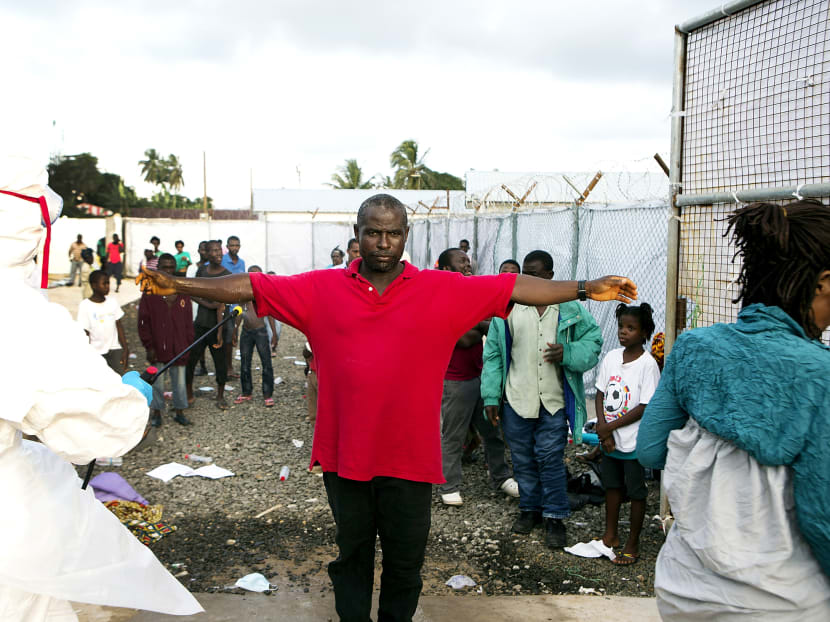Nurse in Queensland being tested for Ebola
CAIRNS — A nurse who treated Ebola patients with the Red Cross in Sierra Leone has been hospitalised in Australia after developing a low-grade fever, health officials said, heightening fears the deadly virus may have reached the region.

A patient is disinfected as he is discharged outside a clinic in Monrovia, Liberia, where patients are treated for Ebola. The outbreak in Sierra Leone, Guinea and Liberia has killed more than 3,800 people. PHOTO: REUTERS
CAIRNS — A nurse who treated Ebola patients with the Red Cross in Sierra Leone has been hospitalised in Australia after developing a low-grade fever, health officials said, heightening fears the deadly virus may have reached the region.
The 57-year-old volunteer recently returned to Cairns, in the north-eastern state of Queensland, where she has been isolating herself and checking her temperature twice daily, Ms Jeannette Young, the state’s chief health officer, said.
The nurse reported a temperature of 37.6°C. Results of the tests for Ebola and other possible infections are expected today. If confirmed as positive, the nurse would be the first Ebola patient in the Asia-Pacific region.
“Importantly, she has reported that while in Sierra Leone, strict Personal Protective Equipment, or PPE procedures, were followed at all times and were not breached at any stage,” Ms Young said. “However, as her temperature does demonstrate a low-grade fever, which can be symptomatic of Ebola virus disease, all necessary precautions are being taken.”
The Ebola outbreak in Sierra Leone, Guinea and Liberia has killed more than 3,800 people, among them doctors and nurses caring for the sick. About 401 healthcare workers have been infected in West Africa and 232 of them have died, the World Health Organisation said on Wednesday.
The disease has also spread to the United States where a man in the state of Texas died this week after he returned from West Africa with the virus. Another nurse in Spain was also infected with Ebola and remains in hospital. The nurse hospitalised in Australia was identified as Ms Sue-Ellen Kovack by the Australian newspaper. Ms Kovack also has a roommate who reportedly has not shown any symptoms of the disease so far.
Ms Kovack returned home on Tuesday, the newspaper reported.
She was working in Kenema, in Sierra Leone’s south, with the International Federation of Red Cross and Red Crescent Societies in a Ebola treatment centre, Australian Broadcasting Corp reported.
Photographs posted on her Facebook page show her wearing a hazardous material suit, goggles, gloves and boots and commenting on taking blood from an Ebola survivor at the centre.
Countries around the world have stepped up their efforts to combat the worst outbreak ever of the disease, but the fight is still lacking, said officials. US Secretary of State John Kerry on Wednesday called for more action and more funding to fight Ebola.
“The fact is more countries can and must step up,” Mr Kerry said, warning that there were “still not enough countries to make the difference”.
So far, the US and Britain have together contributed US$120 million (S$152 million) to the fight against Ebola, with Canada putting up an additional US$31.9 million and a large amount coming from such institutions as the World Bank. But there is a US$306.2 million shortfall from the UN’s goal of reaching US$998 million to fight the epidemic.
The US also announced on Wednesday that health officials will require temperature checks for the first time at five major American airports for people arriving from the West African countries hardest hit by the deadly Ebola virus.
However, health experts said the measures were more likely to calm a worried American public than to prevent many people with Ebola from entering the country. Still, they constitute the first large-scale attempt to improve security at American ports of entry since the virus arrived on American soil last month. AGENCIES









